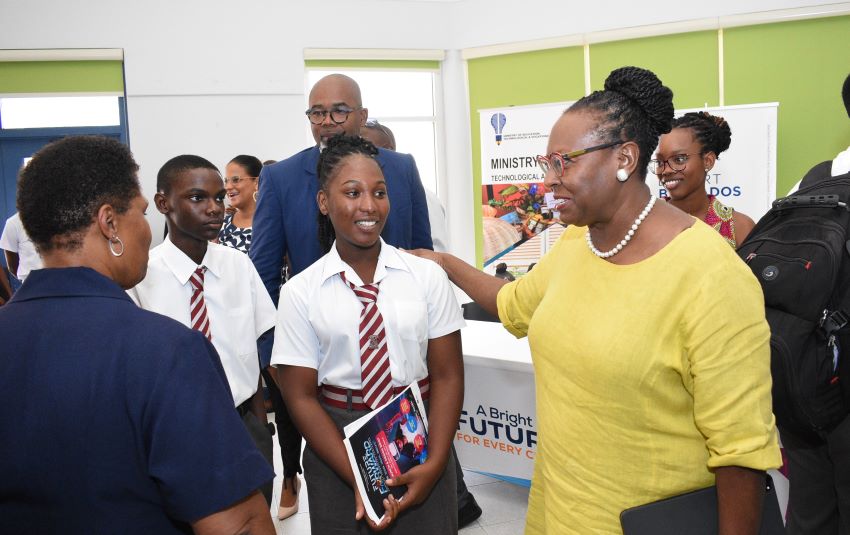The project-based approach to the Future Forward Schools’ Innovation Challenge is the Ministry of Education, Technological and Vocational Training’s way to continue its move to education transformation.
This was underscored today as the Ministry launched the Future Forward Schools’ Innovation Challenge, at Bagnall’s Point Art Gallery, Pelican Craft Centre.
Education Minister, Kay McConney, noting that the project was about moving the children out of the classroom and placing learning in the real world, said it was not just about learning in the classroom with books but that the students are able to look at the real world, and find real problems. “And, bring what you are learning in the classroom to solve real world problems,” she stressed.
Students were also told that they possess different strengths and intelligences and encouraged to value these, whatever they were. The Minister urged them to value the strengths of team members as this would help them get through and win the Challenge.
“Partnership is what matters,” she said, while acknowledging that the Ministry’s team, led by Coordinator for the Challenge and Education Officer, Dr. Denise Charles, was “leading the initiative”, with collaboration from Export Barbados and Future Barbados.
Ms. McConney added: “We will get nothing done unless we learn how to work together. So, part of the learning from this to you is not only solving the real world problems with a real world solution that you develop for the sustainable world in which you want to live, but it is also building relationships that will allow you to collaborate.”
The secondary schools in the competition were urged to use all resources and to understand that mass collaboration would also make the difference for them. Ms. McConney further noted that, over time, there could be a role for businesses and others in their school community, at different stages of the Future Forward Schools’ Innovation Challenge.
Meanwhile, Chief Executive Officer (CEO) of Export Barbados, Mark Hill, encouraged the students to take the Challenge seriously.
Explaining that in Barbados a situation exists where design and innovation is at crisis point, he said whereas the bio-based economy was growing at 22 per cent, with medical and pharmaceutical activities being developed and expected to grow, on the other hand, the design economy was declining by five per cent, per quarter.
He stated: “In industry, we have a crisis at hand. We are not seeing the human capital moving into the design industries and therefore anything to do with helping to produce the human capital that we need to help turn that tide, we (Export Barbados) really want to do significant investment into, to move that economy forward.”
Emphasising that design was a critical space Barbados needed to put some energy into, he added that the Ministry of Industry, Innovation, Science and Technology had been focusing on making the island “the most innovative island on earth”.
Stressing that to achieve this it was necessary to have some of the most innovative people on earth operating from Barbados, the CEO, said they were also on board with the Sustainable Development Goals, which guide the Challenge competition.
He noted that Export Barbados was incentivising the Challenge competition to ensure students and teachers “took it really seriously” and, said: “I am topping this up by going to my Board to say ‘look, let’s invest even more in design’.”
He also told Minister McConney that one of the things he hoped to see was the Industrial Arts programme, within secondary schools, transformed from Industrial Arts to Industrial Design, so that “it is not reduced down to making a little napkin holder and chairs…. when the rest of the world is using robotics, Ikea-typed joints and fixtures to put together furniture.…”
While he noted that from an engineering point of view, the island was way behind in terms of the technology that is out there, he gave the assurance that Export Barbados would volunteer to assist with the Industrial Arts programme as it remains very important to the schools.
Mr. Hill also stated that his organisation would be contributing $50,000 to the Future Forward Schools’ Innovation Challenge. Itemising the amount that would be invested, he said: “Design is hard work with lots of hours to solve problems; so, what we are going to do is we are going to put in $10,000 to be divided up among the 98 students…; about $700-plus, per team; $1,000 per school to purchase your proto-typing material…for research and development and then $25,000 towards the prize monies.”
(BGIS)
